[Copy of] Last Nights
Blog Written By Casey Perry
It’s a funny feeling, saying goodbye.
It washes over you like a big swell in stormy seas; the realisation that this person you’ve spent so many special moments with, is leaving. The white caps foaming as you realise you may never see them again.
It’s amazing how close you become to one another when living on an island, your tent just metres from theirs.
The last couple of weeks we have said goodbye to a couple of really special interns. We didn’t quite know how to show them just how much we’d miss them, but luckily for us the whales that had grew to become a part of us here; visiting daily, checking up on us, knew just the right way.

It had been a busy day with many new-and old-faces visiting the island, a rarity to see so many in just one day, we even had a group join us for a special farewell dinner that night. We called it our ‘party night’; everyone had a shower, a feast was cooked, wine was drunk and laughs filled the crisp air. And blows too. During dinner we were blessed with a show, as we often are here on Gill Island, the whales coming so close you could almost feel the mist of their blows settling on your skin. It was Janie that suggested we go sit up on the lab deck where we would be able to see 180 degrees of our ‘front yard’, so to speak, the magic unfolding before us.

The sea sparkled like a glint in someone’s eye – we were in for an extra special treat tonight. The silence settled around us comfortably as we tried to absorb the sights and sounds engulfing every cell of our bodies. The sun began to set and the whales continued to come, fluking into the golden light and disappearing into the ocean’s depths as the sun sunk lazily below the horizon. As the light began to fade and the stars began to shine, the whales’ breath continued to punctuate the spell of the silent night. It was difficult to truly comprehend what was happening that night, as each of us tried to really feel this moment, one which no doubt would stay with us all for years to come.

Photogragh By Florent Nicolas www.florent-nicolas.com
What seemed like minutes (but was really hours) later, our guests had to leave and all that were left were our 3 interns who were soon to say goodbye, and myself and Janie, who would still remain. The 5 of us sat with our legs dangling off the deck, huddled under a blanket and clasping a glass of wine to toast new friends who would soon become old ones and to the whales who brought us all together.
Time really seems to move differently here. Days flow continuously into one another, yet at the same time, it somehow simply stops. Allowing you time to think, to heal, to experience; the days punctuated by raindrops and sun rays and whale blows. I feel suspended in mid air like a humpback’s body weightless in the water, drifting in silence and with such inner peace I can no longer tell what are my dreams and what is my reality, or if they have somehow managed to find each other in a sea of uncertainty.
We really don’t need a lot to make us happy. If we strip back us humans to our primal instinct, all we seek is simply nature and wilderness, freedom and love, a moment so special it all but takes your breath away…
I looked up at the stars that night and thought of how interesting it is that their light only reaches us long after they have physically gone. I hoped that the same would be for our new friendships formed these months, that they would continue to light up my life well after these first special moments of meeting.
Volunteer/Intern program 2018
Cetacea Lab is a land based whale research facility located along the remote north coast of British Columbia, Canada. We are now accepting applications for the 2018 field season from May until the end of September. All positions are for 1 to 2 months duration. There is a weekly fee for food. These are volunteer/intern positions to help with the collection of data on the habitat use and abundance of northern resident/transient killer whales, humpback and fin whales. Both the Lab and out camp are located in areas of high abundance of all three species. Due to our remote location applicants need to be in good physical condition, able to participate with the daily routine of living off the grid and comfortable sleeping in a tent in the wilderness of BC. There is a lot of hard physical work that will come with this position, you must be fit without any physical injuries. There are no roads, very limited Internet access, very limited medical service and power is completely off the grid.
- Daily shifts involve scanning for whales, documenting all sightings and when possible to take identification pictures of whales
- Listening and recording all whale vocalizations that are transmitted to the lab facility from our network of hydrophone stations
-
- Data entry from land based and marine vessel based surveys
-
- Identification work of all whales from photographs taken in the field
-
- There will also be a lot of heavy lifting and moving over uneven rocky terrain, chopping wood ( our only source of heat) and assistance with the physical maintenance of the hydrophone stations.
- Experience with carpentry, electronics, IT, social media, website building and environmental communications would be a valuable asset. Interested applicants should send a letter describing why they would like to join our team, CV and letter of reference to This e-mail address is being protected from spambots. You need JavaScript enabled to view it
References will be contacted. More information about our research can be found at www.forwhales.org
All the Best,
Hermann Meuter
Last Nights
Blog Written By Casey Perry
It’s a funny feeling, saying goodbye.
It washes over you like a big swell in stormy seas; the realisation that this person you’ve spent so many special moments with, is leaving. The white caps foaming as you realise you may never see them again.
It’s amazing how close you become to one another when living on an island, your tent just metres from theirs.
The last couple of weeks we have said goodbye to a couple of really special interns. We didn’t quite know how to show them just how much we’d miss them, but luckily for us the whales that had grew to become a part of us here; visiting daily, checking up on us, knew just the right way.

It had been a busy day with many new-and old-faces visiting the island, a rarity to see so many in just one day, we even had a group join us for a special farewell dinner that night. We called it our ‘party night’; everyone had a shower, a feast was cooked, wine was drunk and laughs filled the crisp air. And blows too. During dinner we were blessed with a show, as we often are here on Gill Island, the whales coming so close you could almost feel the mist of their blows settling on your skin. It was Janie that suggested we go sit up on the lab deck where we would be able to see 180 degrees of our ‘front yard’, so to speak, the magic unfolding before us.

The sea sparkled like a glint in someone’s eye – we were in for an extra special treat tonight. The silence settled around us comfortably as we tried to absorb the sights and sounds engulfing every cell of our bodies. The sun began to set and the whales continued to come, fluking into the golden light and disappearing into the ocean’s depths as the sun sunk lazily below the horizon. As the light began to fade and the stars began to shine, the whales’ breath continued to punctuate the spell of the silent night. It was difficult to truly comprehend what was happening that night, as each of us tried to really feel this moment, one which no doubt would stay with us all for years to come.

Photogragh By Florent Nicolas www.florent-nicolas.com
What seemed like minutes (but was really hours) later, our guests had to leave and all that were left were our 3 interns who were soon to say goodbye, and myself and Janie, who would still remain. The 5 of us sat with our legs dangling off the deck, huddled under a blanket and clasping a glass of wine to toast new friends who would soon become old ones and to the whales who brought us all together.
Time really seems to move differently here. Days flow continuously into one another, yet at the same time, it somehow simply stops. Allowing you time to think, to heal, to experience; the days punctuated by raindrops and sun rays and whale blows. I feel suspended in mid air like a humpback’s body weightless in the water, drifting in silence and with such inner peace I can no longer tell what are my dreams and what is my reality, or if they have somehow managed to find each other in a sea of uncertainty.
We really don’t need a lot to make us happy. If we strip back us humans to our primal instinct, all we seek is simply nature and wilderness, freedom and love, a moment so special it all but takes your breath away…
I looked up at the stars that night and thought of how interesting it is that their light only reaches us long after they have physically gone. I hoped that the same would be for our new friendships formed these months, that they would continue to light up my life well after these first special moments of meeting.
A Day To Remember
It has been weeks since I left Cetacea Lab and returned to Vancouver. After two months of waking up to whales and wildlife, it is strange now listening to construction and downtown traffic. My time spent on Gil Island was utterly amazing, and I have endless appreciation to Janie and Hermann for making that time so special and full of unforgettable whale experiences. There is one day, however, that stands out the most in my memory, and for this day, I have two Gitga’at Guardians, Bunker and Nicole, to thank.
After a slow morning at the Wall outcamp, the other intern, Sam, and I explored the nearby coastlines and tidal pools and read in a hammock under the observation deck. In the afternoon, however, everything changed and we were overwhelmed with whale activity. The Wall is situated so that there is about 20m of rocks in front of the deck that lead down to the water. There is a hydrophone secured in the water so that any and all whale calls are heard through a portable speaker.

Around 3pm we started hearing orca calls, which honestly sound similar to aliens attempting to communicate, and we spotted them offshore to the west of us, heading our direction. Sam and I were starting to get excited, as all orca encounters to us are simply magical. Shortly after the first pod passed by the deck, we got a call on the radio informing us that two other orca pods were heading our way. We could hardly contain our excitement, despite not wanting to get our hopes up in case the incoming orca decided to change direction or behaviour. Fortunately, we spotted one of the pods about to pass by us, all the while hearing increasing vocalizations on the hydrophone. Just after that pod passed by to join the first, currently feeding and milling quite far in the distance, a third pod passed just a couple of meters from the rocks in front of the lab. It was astonishing to hear all three clans vocalizing at once, calling to one another and eventually all congregating. Once the third pod passed us, Sam and I relaxed, overwhelmed by the amount of whales we had just witnessed and trying to process the experience.This was about the time when Bunker and Nicole radioed us to ask if we wanted to join them on their boat to take ID photos of the orca. Enthusiastically (sounding a little over-eager and borderline desperate), we agreed, and in no time were on our way to the group of over 30 individual orcas. To be honest, when we reached the whales and were surrounded by large males with 6ft dorsal fins and females with the smallest of calves, I was in complete shock. These have been my favorite marine species for years, and I was finally able to observe 100 meters. To my surprise, Bunker and Nicole were just as in awe as I was. After researching whales for two years, they still experience each whale encounter as if it was the first time, with pure amazement and an undying love for these creatures.
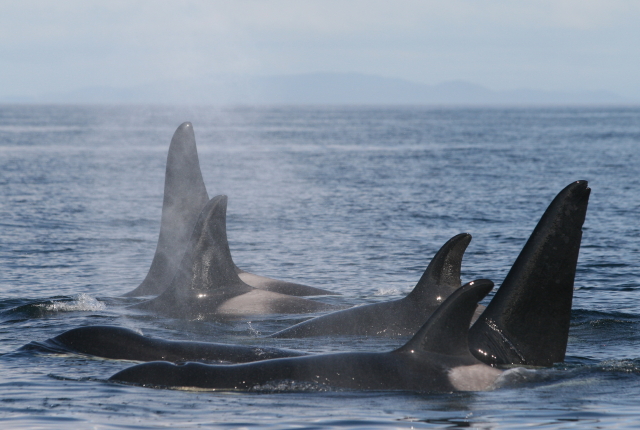
I will never forget that day, surrounded by 30+ orca and in the midst of frantically capturing ID shots, remembering to take a breath and realize that I will quite possibly never experience something this incredible (in regards to whales) ever again. It was a day that makes every decision and all the hard work up to that point worth it. All I can do now, back at home in Vancouver, is remember how passionate I felt in the moment of all the whale activity, and hope that one day I will return to Cetacea Lab to visit these incredible whales once again.
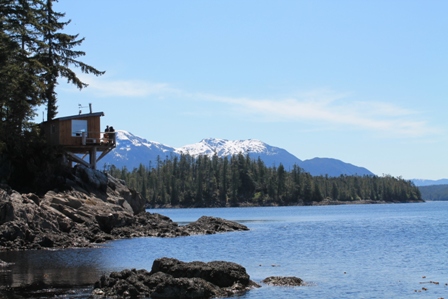
From Scotland to the Wall
Written By : Laura Davies
Having grown up in Scotland I am no stranger to the overwhelming beauty and tranquility of nature, there is always that moment (for me at least) where you just stand; take in the view that is in front of you and just smile, really smile. That is exactly how it is on Gil Island. Every day I wake, have breakfast and start work at 8. When “shift” starts I am out on the deck of the lab with the vast expanse of silent, pristine fjords to occupy my eyes, forever changing, always captivating and if it weren’t for the occasional small fishing boat or a chance sighting of a plane’s vapor trail you could, and do, often forget that there is a whole other world outside.
Three weeks later, after settling into life on Gil, I was transported to “The Wall”; Cetacea Lab’s out-camp, which is a tiny island situated off the Northern tip of Rennison Island. It is not a place for the faint hearted. The ascent up to the cabin in itself is a tad scary, the cabin is basic and can be a little chilly when the northwest wind blows.

Forget that you know what a shower is and that you have any concept of what a modern day toilet is - if you can accept this I promise you that you will not be disappointed. Although, the reason you go to the Wall is predominantly to collect data on orca, fin whales and the bubble net feeding events of the humpback whale, which, don’t get me wrong, is a spectacle to both see and to hear, I found the other treats the island had to offer were just as intriguing….
Having grown up on the coast one of my favorite past times was to go investigating the rock pools – the wall and the adjacent island that can be reached during low tide were quick to rekindle my childhood curiosity.
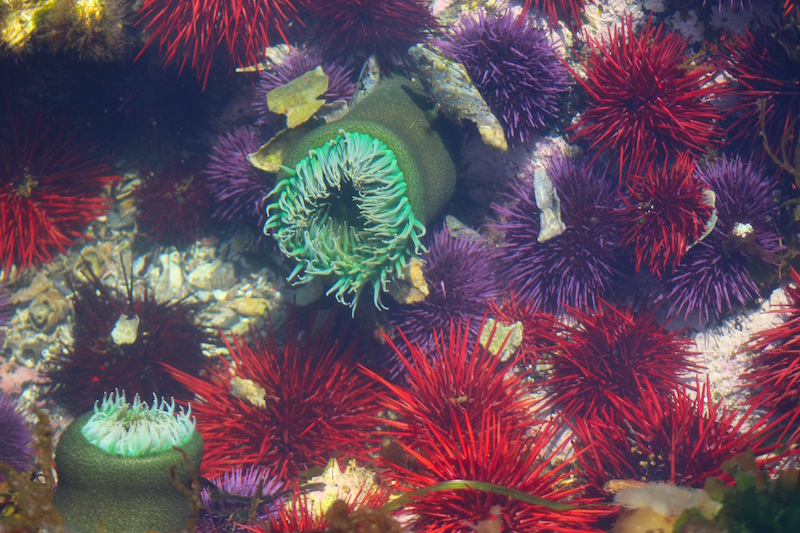
However, it was not quite as evident a curiosity as my island companion; Elyse, whom could have profited from having a pair of child restraint straps permanently attached to her. I’ll give her her dues though – her enthusiasm did result in me seeing my first and probably the cutest Nudibranch I will ever see. Overt your eyes from the rock pools and you’ll find the quarrelsome Bald Eagles and their less than quiet offspring. The sea otter;
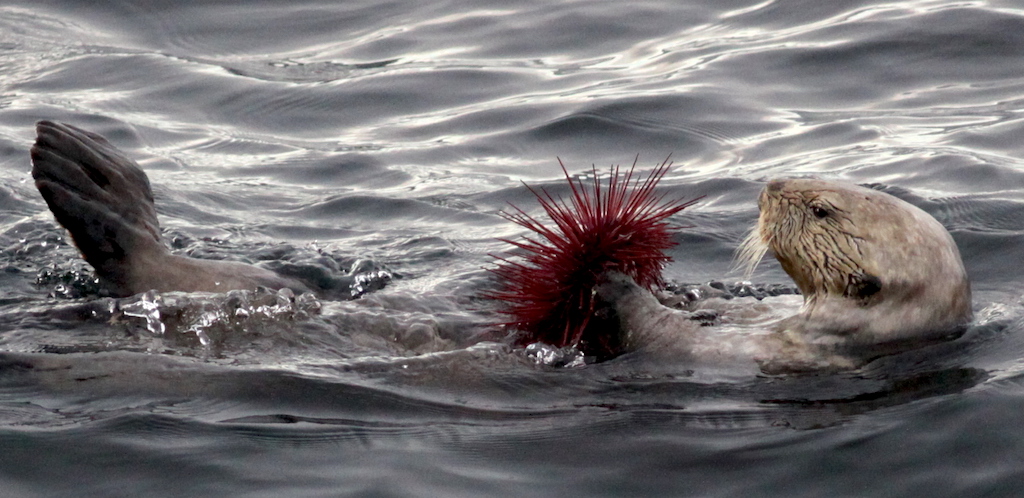
which turned out to be not “a really old sea lion” (Hofs, 2016) gave us a fantastic display of how to look effortlessly sauvé floating in sub freezing temperatures whilst eating dinner off your own stomach.
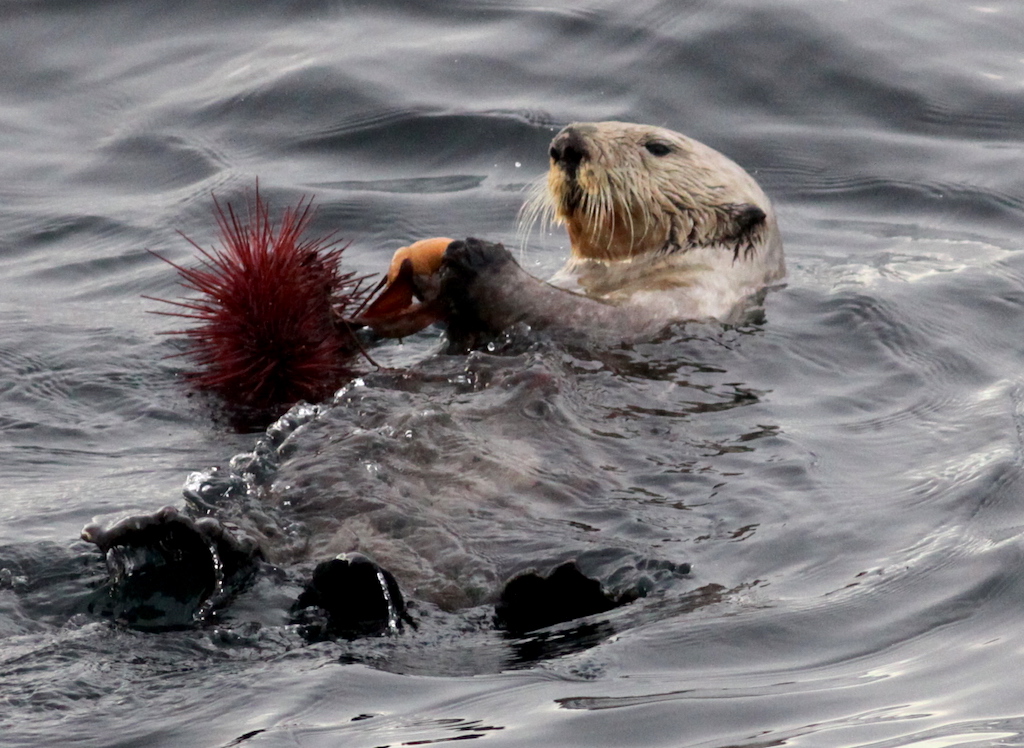
the harbor seal, Pablo, and ultimately the awe inspiring Orca. Such magnificent and humbling creatures, all .I am truly lucky, not only to have spent time with them, but to have observed them in their natural, unspoiled environment – exactly how it should be.
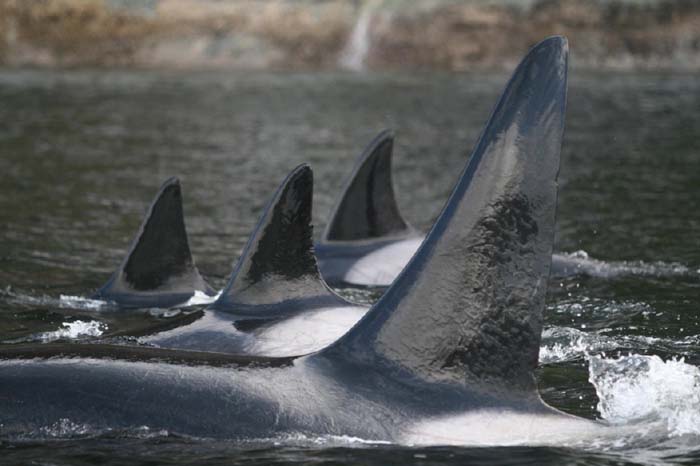
I am also lucky and thankful to have been sent out to the wall with my aforementioned companion, Elyse. Living in close quarters with someone in such circumstances are difficult, however she made it not only easy, but hilariously brilliant; even when the weather fell below the standards of someone who lives in Scotland. But mostly I am grateful to both Janie and Hermann. Thank you for allowing me to come share your island(s) with you but mostly – thank you for fighting to keep it a paradise, a place that made me smile, really smile.
Until We Meet Again
This Blog was written by Kara Henderlight - an Intern and part of the Whale Point Dream Team 2015!!
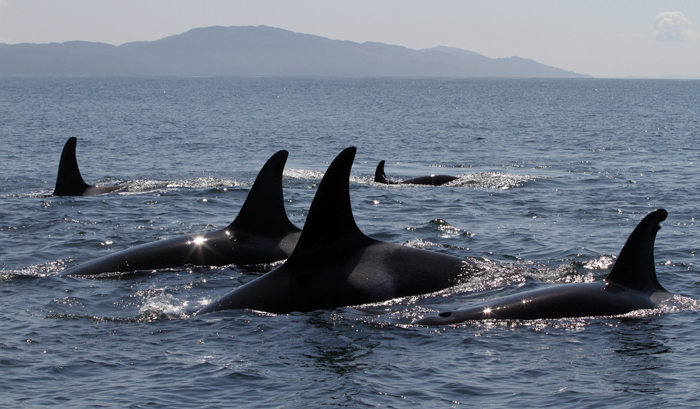
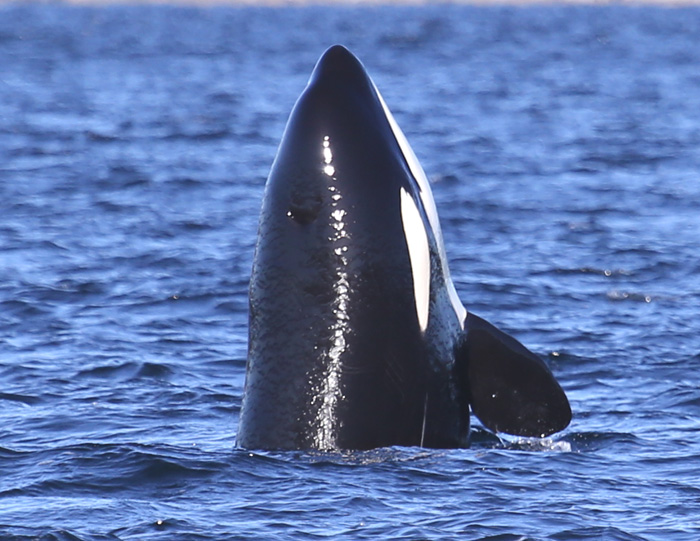
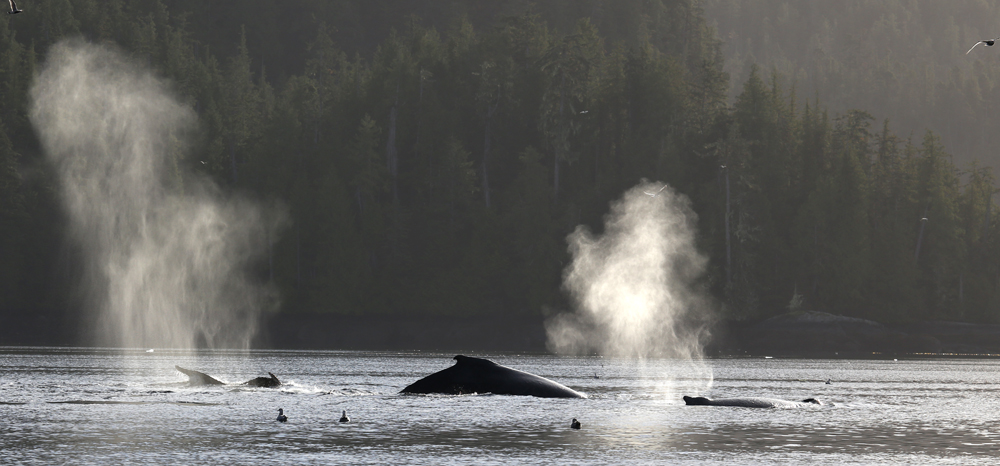
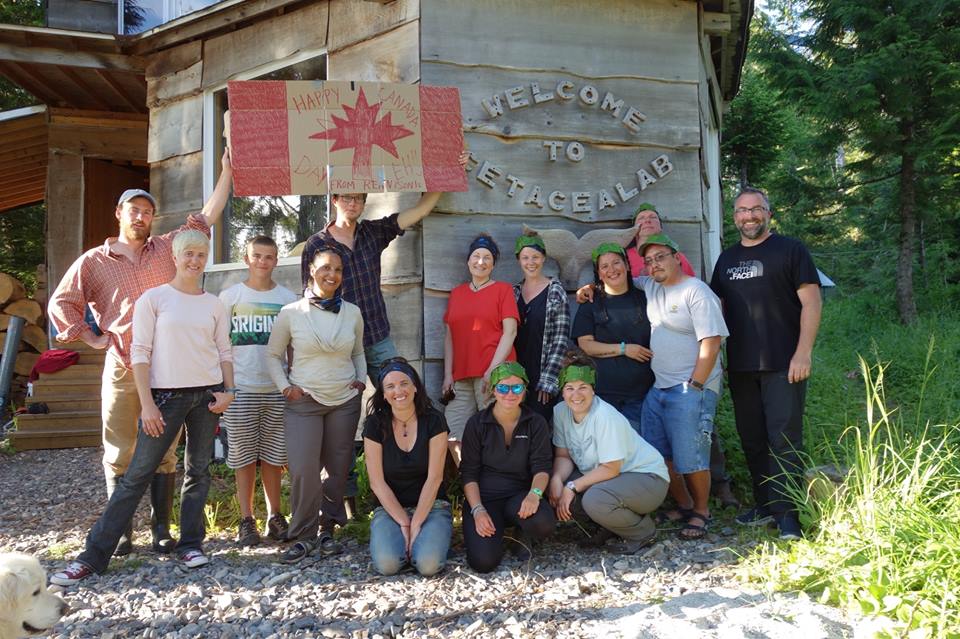
The Flow Of Whales
This Blog was written by our dear friend Jenn Dickie
Our day started bright and early as we pulled away from Whale Point to the type of glorious morning that makes getting up at the crack of dawn a worthwhile endeavor.

Michael Scholl from the Save Our Seas Foundation with his stepson Yoann joined us, and with a cup of coffee in hand, camera in the other, we headed out on our whale survey at 6am. The first stop would be to see if we could ID the two whales that Janie had noticed at the mouth of Whale Channel. Our plan for the day was to have a quick look at these two then head north in Squally to see if we could find the fin whales that had been reported in the area, make a stop in Hartley Bay to top off the fuel supply then poke around a little to see what we could find.
Over the next 2 hours we came across 10 humpback whales, all seemed to be heading in a southerly direction. In order to ID a humpback whale it is necessary to photograph the underside of their fluke (as each is as unique as a fingerprint) and with just one whale remaining to ID, who was refusing to fluke, we carried on following it south. The 5 minutes we had allotted this whale turned into 30 and the line that divided the glassy calm seas where we were, from the choppier waters to the south kept moving further into the distance. Something was pulling us south! Before we knew it we were half way across Caamano Sound, heading in the opposite direction to our planned route. After a call from Nicole and Bunker at the Gitga’at cabin on Rennison Island notifying us that the bubble net feeding group had been spotted nearby, and confirmation from Hermann that the fuel we were to pick up in Hartley Bay was not critical, we decided to stop fighting the flow and follow these whales to the south. We said goodbye to our resting whale, who never did fluke, and were off across Caamano Sound.
We arrived at the Wall Islets just as the feeding group surfaced and for the next two hours we followed them as they made their way into the calmer waters of Bouchaman channel.
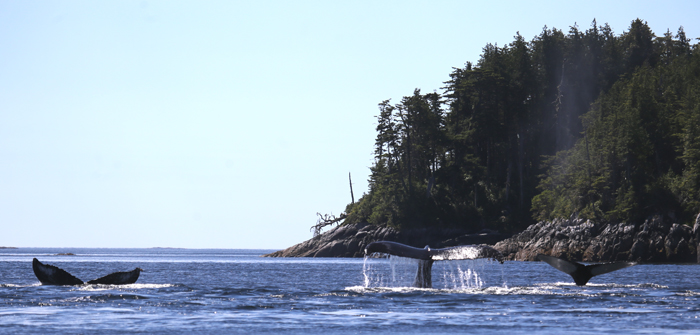
In the time we were with them the group grew from 6 whales to 14 as a number of the whales we had seen earlier in the day further north arrived and joined in. I doubt there are many spectacles in nature so remarkable as watching 14 enormous mammals breaching the surface of the water, in unison, mouths open to gorge on what I can only assume must be a massive school of hearing. This feeling was enforced later that evening when we got to see what this looked like from the air, thanks to the incredible drone footage that Michael managed to make of the final bubble net of the day.
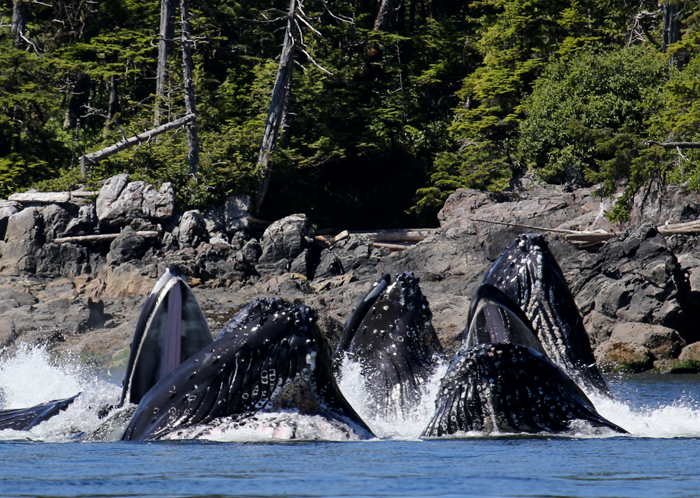
As if the day had not been spectacular enough, when we returned back to Squally Channel we were greeted by a humpback calf who had gaining a little freedom from Mom and decided to do a some breaching and head lobbing before stopping by the boat to say hello.
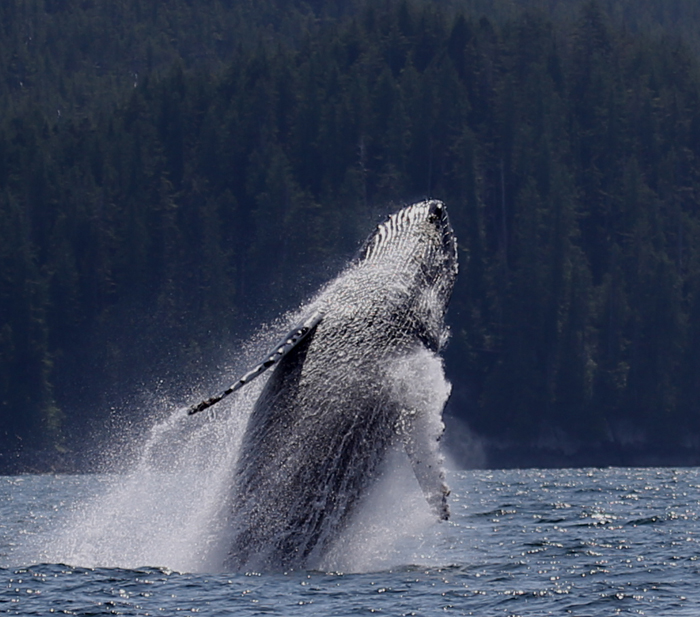
A few moments later Mom showed up to put an end to the play and usher it away. Time to go home?? Apparently not… 3 more blows in the distance, and as we approached to investigate, the fin whales we had originally been seeking appeared.
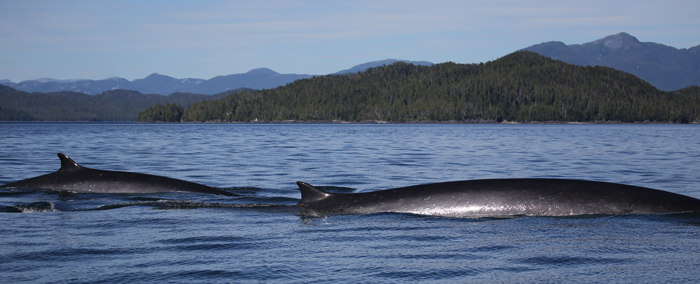
After 12 + hours on the water, all but 40 minutes was spent in the company of whales. I have since identified 28 whales we met in 10 separate encounters, some of whom travelled the same 40 miles that we did over the course of the day. We returned to Whale Point, thrilled with our day in the Greatbear Rainforest, which never seems to disappoint!!!
Oh Those Fin Whales
This blog was written by Erica Page, a 2015 intern at Cetacealab. This is her account of a close encounter with fin whales and she hopes it demonstrates the need to protect this threatened species from the threat of proposed introduction of large tankers.
During the last six weeks at Cetacealab I have seen and experienced things that I thought I would only dream of. I have had beautiful and incredible encounters with whales and each has been unique and perfect in its own way. This afternoon I experienced a moment with the whales that not only demonstrated their magnificence once again, it reaffirmed why these whales deserve to be protected. To say that today was unforgettable would be a severe understatement – today was downright life changing.
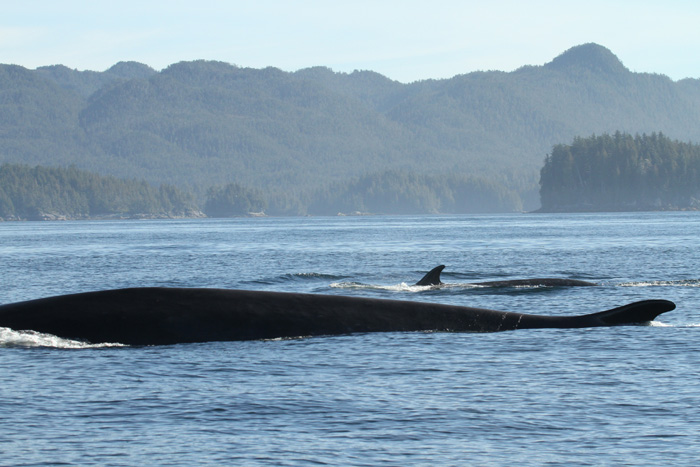
Hermann and I had just finished working on the Gil Island hydrophone station when we noticed many blows in the distance across the channel from us. We decided to go check it out and we first came across a group of five humpbacks. We took some ID shots but we could still see more blows a little further off behind them, so we made our way in that direction. As we got closer we realized this was not another group of humpback whales, these were fin whales!
Fin whales are the second largest creatures on Earth and from the early 1900s to the 1970s they were one of the most hunted whale species on the planet. Due to the commercial whaling industry, their populations were nearly depleted and fin whales were almost entirely lost. The species is just beginning to make a comeback, though now they are being threatened in a new way.
Instead of explosive harpoons, the fin whales are now faced with the pollution of their waterways. Their homes are filled with human garbage and their communication is disrupted by the noise of ships and tankers. Furthermore, the gargantuan size of fin whales makes them an easy target for ship strikes. Within the past several years, more fin whales carcasses have been found wrapped around the bow of cruise ships than any other whales. This is a gruesome reminder at the death and destruction that occurs when large ships are introduced into the habitat of marine life.
When the whales surfaced from a dive, we were able to count SIX fin whales together in a group. Fin whales typically travel solo or in a group of two so seeing six fin whales together was quite the spectacle. I had the camera up to my eye trying to get good IDs when the whales gathered on the starboard side of the boat. They are so sleek and streamlined that they can move extremely fast. Hermann adjusted the boat to their speed and finally we were right alongside them as they rose in and out of the water travelling along. At this point I was overcome with emotion and the tears started flowing. The only way I can describe how I was feeling is that it was like galloping along next to a herd of majestic unicorns.
In 2014, the Canadian government approved a project called the Northern Gateway Pipeline Project, which would allow Enbridge to build an oil pipeline to the waters of the BC coast, requiring thousand-foot-long tankers carrying crude oil to travel directly through the habitat of fin whales. Not only would this project increase the chances of disrupting the entire ecosystem through the potential of an oil spill, the underwater noise level would increase, and the large tankers could cause a significant rise in the number of ship strikes of not only fin whales, but also humpback and killer whales who also use the area as their feeding grounds. This balance of this entire region is at risk due to the Enbridge project.
When Hermann saw my leaky eyes, he took the camera from me so I could just enjoy the moment. The whales then went down for another dive so he shut the boat off and I had a few minutes to get it together. When the whales came back up, though, Hermann and I both lost our composure. The six fin whales were completely surrounding the boat, just feet away! Every way we turned our heads, whales were right there next to us! Every blow they let out was like a bomb going off and every breath sounded like the strongest northwestern wind. We were hysterically laughing and crying and screaming and woohoo-ing. The whales circled us calmly, swam right at the boat, and at the very last second ducked down and swam right underneath us. They continued on swimming and Hermann and I let them be. We both were shaking and as they swam off we stood there in awe at what had just occurred.
In his oral evidence testimony during the JRP hearings in Hartley Bay, Gitga'at councillor Cam Hill illustrated a poignant message. He stated that for all people affected by the Enbridge pipeline, there is a dark cloud permanently lingering over their heads as they live out their daily lives. The dark cloud represents the fear and anxiety of the potential destruction this pipeline would cause the wildlife, and the damage it would inflict upon the lives of the First Nation’s people.
As we were watching the fin whales swim away, Hermann and I were sobered by the dark cloud looming overhead. The fact that our encounter with these fin whales could possibly be the last filled us with an overwhelming sadness, replacing the joy we had felt just moments ago.
Though the dark cloud weighs heavily on the minds of those affected by Enbridge, small rays of sunshine can be seen peeking through if only one looks hard enough. Hope is never lost when there are those that care and are willing to fight for what they believe in. The voices of the First Nation’s people will not be silenced until their home no longer faces the threat of oil tankers. The whales of the Great Bear Rainforest are deeply cherished and the fight to protect them has only just begun.
A46:The Individualistic Orca
This Blog was written by Kara Henderlight an Intern who has joined us from Wisconsin, USA
The first time I ever saw A46 in the waters of the Great Bear Sea, apart from wiping the tears from my cheeks, I expected to see several other stealth like black dorsals cutting thru the water in unison with his. I waited for numerous, powerful blows of the world’s most notable marine mammals. As I listened to A46 call on the hydrophone, I waited and waited for a response from a fellow A Clan member, but nothing resonated back. I whole-heartedly forgot that he was indeed, alone. I felt a momentary lapse of sadness, but then a sense of hope came over me. These feelings of optimism stemmed from the prospect and notion that he has been spotted with other orca from a different matriline on various occasions throughout his life. Maybe in fact he is not alone, but rather living his life as an individualistic orca.
Northern and Southern Resident Orcas are known to spend their lives in complex, social, matrilineal family groups. Male orcas actually live with their mothers, the entirety of their lives. That is why the plight of A46 is quite unique.
Sophia, or A36, had three sons A46, A37, A32 and a daughter A44 who passed away at the tender age of two. A fellow A1 Pod, A Clan mother, A12, had two sons (A31 & A33) and a daughter (A34) of her own. These two matrilines spent time foraging and travelling together, their young interacting and acquainting themselves with one another. This is common in the world of the orca. As life went on, Sophia passed away leaving the boys orphaned. A12’s sons passed away over time, and her daughter was frequently leaving to create and raise a family of her own, which resulted in A12 being alone occasionally. Ultimately, A12 took in Sophia’s orphaned offspring, which is not unheard of.
Over the years, the family dwindled as A32 passed away as well as A12. By 2013, A37 and A46 were again, on their own. The last time A37 and A46 were seen together was in the fall of 2014, ergo leaving A46 without a complex and social family bond, or so we thought. At the close of the 2014 season, A46 was last seen travelling with A12’s daughter, A34. The relationship and bond that had been nurtured over the years amongst the A12 and A36 matriline was still in tact. This reunion gives the luminescence behind that little spark of hope a whole new brightness. Although A46 isn’t living his life along side his maternal mother, Sophia, as his unique family history depicts, he does have a matrilineal pod he can occasionally connect with that brings familiarity and companionship to him.
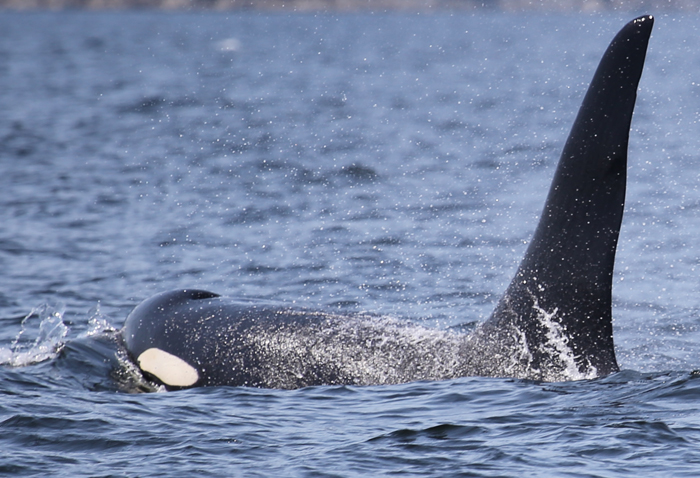
The day I saw this incredible being, travelling by himself, he looked strong and healthy. His grandeur dorsal fin, with the slight wave and small knick on top, seemed to never fully submerge due to its prominence in the water. He appeared content, not lost or aimlessly searching, but rather as if he was on a mission or an adventure on a steady path to somewhere or someone. He is no longer an atypical whale, representing a specific type, group, or class, but rather an individualistic orca, representing himself.
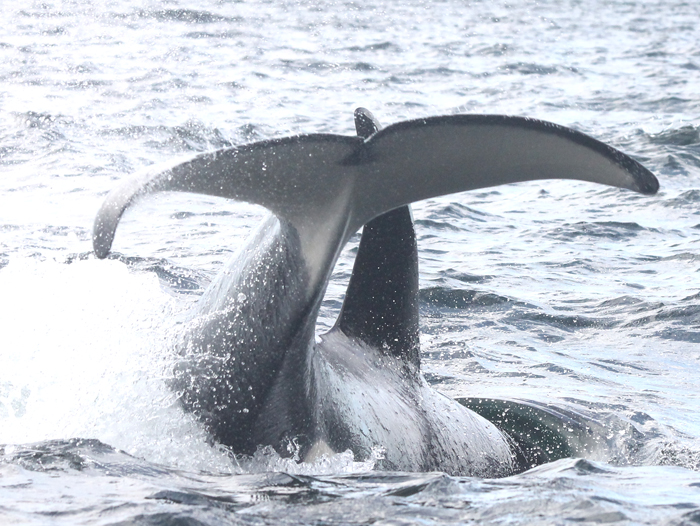
A few days after Kara wrote this blog we had a report of over 20 orca traveling close to Harltey Bay. The following pictures were taken by Nicole Robinson of A46 who had joined these other families. He was obviously quite delighted to share the waters that surround the Great Bear Rainforest with so many of his compansions of the sea!!
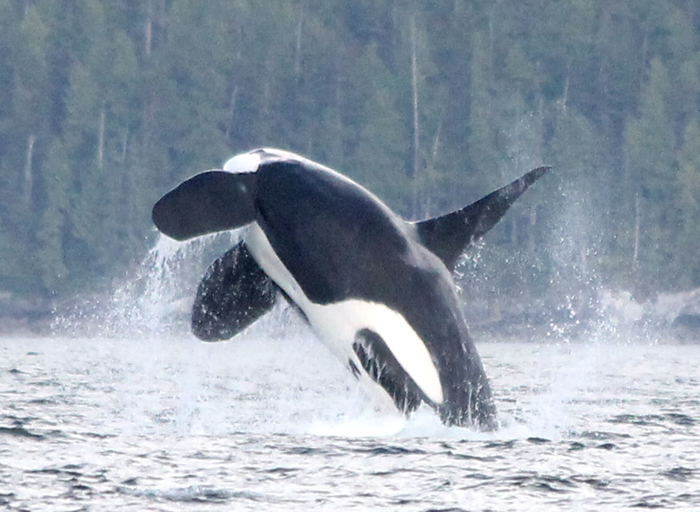
That Orca Feeling
This Blog was written by Erica Page who has joined Whale Point as in Intern for the 2015 Season - this was her first ever experience of seeing an Orca!!
5/12/15
I am still trying to process the events that took place this morning. I have been here on Gil Island a little over a week and when I woke up, I just had this weird feeling that today would be the day I would see an orca. We all gathered in the lab around 7 this morning to have coffee before the day started. I mentioned that I had an orca feeling today and oddly enough, Hermann said he had the same feeling when he woke up this morning. We got skeptic looks from everyone, saying we may have cursed it.
Well we didn’t!! I took the first shift of the day at 8am and after only about 45 minutes there was a call on the radio from one of the Gitga'at staying at the seeweed/halibut camp in Kiel telling us they had spotted killer whales! Here at Cetacea Lab when an orca report comes in, Hermann runs to the boat and one or two interns get to join him. We have to drop everything we are doing and get to the boat first in order to go out. A new intern, Kara, arrived yesterday so she volunteered to stay behind to do some training with Janie, and Carolyn and I got to go on the boat.
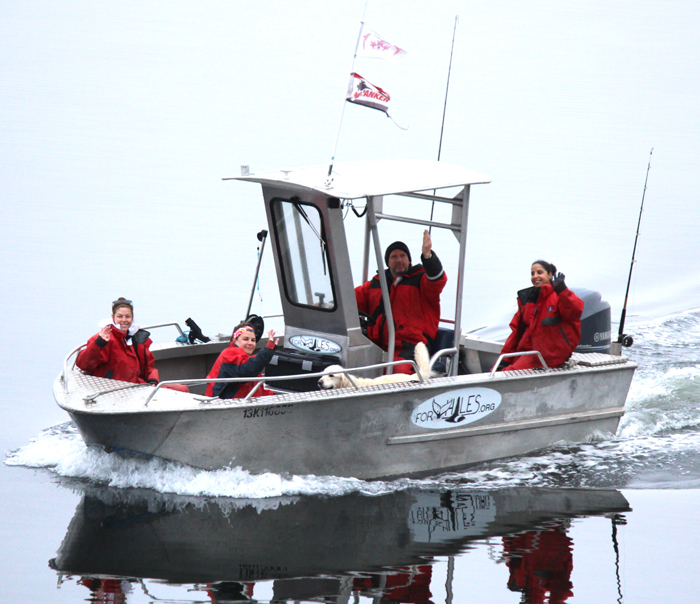
It only took about twenty minutes for us to spot huge black dorsal fins in the distance. As we got closer, I had an intensely emotional reaction that I was not expecting. When I saw the whales, I lost it. I just sat on the boat and cried and cried.
When it comes to whales, humpbacks have always been “my whale,” but seeing the killer whales today was unlike anything I have ever experienced. They are so mesmerizing, almost hypnotic. Apart from my niece and nephews, they were easily the most beautiful things I have ever seen. The whales were just the epitome of freedom and grace and I was so moved by them. I didn’t bring my camera on the boat with me, but I felt fortunate to be able to watch the whales with my own eyes, rather than through a lens.
There were two males with huge dorsal fins that stood straight up, nearly six feet tall. There were also three or four females with much smaller, curved dorsals, and one small whale that was probably a calf. At some points they were so close to the boat you could see their black and white patterns and the little notches on their fins. The sun was just right so they were glistening. It was magical.
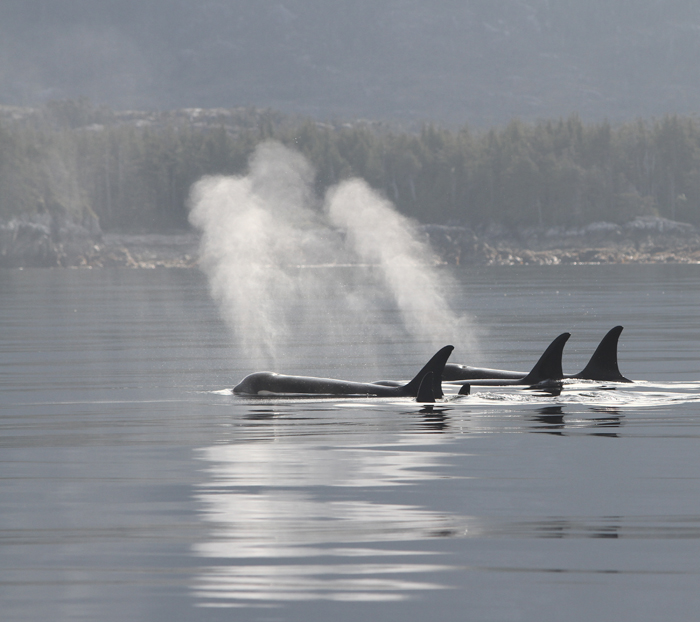
Researchers have discovered that killer whales have extra parts in their brains that humans do not have. While they are not totally sure what the function of the extra parts are, it is believed that they have to do with empathy and compassion. Orcas have the strongest family bond of any other animal, including humans. They stay together for life and are thought to feel each other’s pain and joy. In fact, some think they have intelligence so advanced that humans don’t even have the capacity to comprehend it.
After cruising along side the whales for a while, it was time to turn around and come back to the lab. On the way back, we stopped at what is known as Sea Lion Rock and I was amazed for the second time of the day. There were easily 100, maybe 200 sea lions hauled out on the rock. There were five or six males that were at least four times as big as the rest of the sea lions and they were almost comically large. The males were these huge blubbery creatures that looked like fat worms moving around on the rocks. And the noises they made were unlike anything I’ve ever heard -- they made these really loud, long grunting sounds that sounded sort of like a hundred cows mooing at the same time. It was so fascinating and I could have watched them all day.
Eventually though, we made our way back to the lab and when I stepped off the boat I realized my whole body was vibrating with adrenaline and excitement. I tried explaining what I had experienced to Janie but words failed me. I needed a few minutes alone to come down off my high, so now I am sitting in my tent trying to get my hands to stop shaking.
I still can’t believe the way that I woke up knowing I’d see orcas today. I am trying to rationalize it but all I can think is that the energy surrounding the entire area is just interconnected and I somehow sensed their presence. This place feels magical to me and I feel so fortunate to be a tiny piece of the movement to protect this area.
It is barely noon now and I still have the whole day ahead of me. What a life!

 Blog
Blog